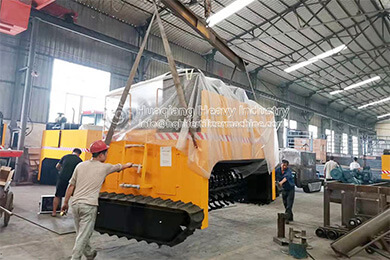
In organic fertilizer production, the compost turning machine is core equipment for material fermentation. However, different types of turners have specific requirements for material characteristics.
1.Materials Suitable for Windrow Compost Turning Machines
High-density materials: Like livestock manure, sludge, and other sticky substances.
Large-volume compost piles: Handling capacities can exceed 3000 m³/h.
Materials with higher moisture content: Mixed compost with 60%-70% moisture.
With their heavy-duty shredding mechanism, these machines effectively break up clumps. They’re particularly suited for large-scale farms and big organic fertilizer plants.
2.Applications for Trough-Type Turners
Fine composting: Materials needing highly uniform turning.
Materials where microbial inoculants are added: For easier fermentation control.

Municipal solid waste: Complex organic refuse.
Their enclosed design minimizes odor spread, making them ideal for projects near urban areas with strict environmental rules.
3.Material Advantages of Chain Turners
Materials high in fiber: Like straw, garden waste, etc.
Piles needing thorough aeration: Their unique structure boosts oxygen penetration.
Long-term stacked materials: Can handle fermentation piles up to 2 meters deep.
Selecting a compost turning machine boils down to precisely matching material properties with machine functions. Understanding key factors–like the stickiness of livestock manure, the fibrous nature of straw-based materials–is essential for picking the best turning solution.